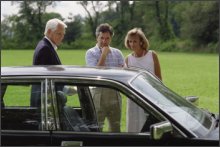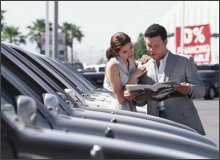What NOT to Do When Shopping for a Car: 11 Key Steps
by www.SixWise.com
Some people cringe at the thought of having to haggle over the price of a new car, while others are excited by the thrill of the "hunt." No matter which category you fall into (or if you're somewhere in between), it's easy to get taken for a ride when you decide to purchase a car.
|

You should have a good idea of what kind of car you want -- and how much you want to spend -- before talking to a car salesperson.
|
Even if the salesperson is just trying to earn an honest dollar, these tips NOT to do are essential for every car buyer to know.
1. Do not go car shopping before you know what you want.
Once you enter a car sales lot, it's easy to get sucked into "special deals" and drive away with an impulse purchase. Do a little research first (online, at car shows, by talking with friends) to determine what kind of car you're after -- and their going rate.
2. Do not shop without knowing what you can afford (and your credit score).
Profits on used cars can be two or three times higher than those for a new car. A salesperson may, therefore, try to sell you a used car for that reason. It is essential for you to know how much you can afford, so you know whether a new or used car is right for you. Also, your credit score will drastically influence what kind of interest rates you are offered on a loan. If you know your credit score, you know what kinds of interest rates should apply to you.
3. Do not tell the dealer how much you want to pay per month.
It's easy to get a $350/month payment for many cars, for instance, but that doesn't mean the final price of the car is the same. How many months the payments extend for and how big a down payment you make both affect the final price of the car. You should only speak of the car's price in terms of the total payment.
"Never answer the question, 'How much can you pay each month,'" says James Walsh, editorial director with Silver Lake Publishing in Los Angeles. "Stick to saying, 'I can afford to pay X-dollars for the car.'"
4. Do not assume the dealer is the best place to get a loan.
As with any other loan, you can shop around, compare offers and get the best deal you can negotiate. "It's very important that buyers not think of the dealer's finance department as their loan agent. The dealer is not required to find you the best rate, and might add to the number by serving as the middleman," says Joe Wiesenfelder, senior editor of cars.com.
5. Do not trade-up your car before paying it off.
It may be tempting to trade your car in for a newer, flashier model, but doing so before you've paid it off is very risky. It can be done legally, by "rolling over" your remaining balance into a new car loan or lease. But in the event that the car is totaled or you trade it in, you'll still owe the large balance from both cars.
6. Do not accept a six- or seven-year loan without very serious consideration.
It may be worth your while to extend your loan for a long time period in order to get lower monthly payments. However, be aware that you'll still be making payments as the car is depreciating in value, meaning that at some point you'll be paying more than what the car is worth. "These loans take forever to pay off," says Mark Perleberg, lead automotive expert with NADAGuides.com.
|

Though it will take some extra effort on your part, discussing all aspects of the car deal (the price of the car, your trade-in value and financing) separately is the best way to get a good deal.
|
7. Do not discuss your trade-in before negotiating a price for the car.
Once you tell the salesperson that you'll be trading in a car, they're likely to inspect it right away. If it seems like they're giving you a good amount for it, it's likely because they're planning to make up that money in the price you pay for the car. You should always negotiate the lowest price for the car before discussing your trade-in.
8. Do not tell the salesperson you love the car.
If the salesperson knows you want the car, you lose negotiating power.
9. Do not leave a cash deposit.
If you later change your mind, you're not likely to get the deposit back. It's also not wise to leave more than $250 for the deposit. If the salesperson says they cannot accept less, walk away.
10. Do not feel obligated to buy a car because you test drove it.
Test driving a car is necessary to determine if it's right for you -- but does not mean you're in any way obligated to purchase the vehicle.
11. Do not sign the paperwork without checking it over.
When you decide on a car and agree on a price, you will receive stacks of forms to sign. Make sure the numbers match up with what you've agreed upon, and check to make sure there are no bogus fees or extras (like fabric protector, an alarm, etc.) that you did not authorize.
Buying a Used Car - Some Extra Tips
Although the above tips apply to purchasing a used or new car, purchasing a used car brings up a whole new set of considerations. When buying a used car, be sure you do the following things before driving away with the car:
-
Ask for the car's maintenance record from the owner, dealer or repair shop.
-
Test-drive the car in a variety of areas (hills, stop-and-go traffic, highways, etc.).
-
Have a mechanic that you hire check it out.
-
Realize that if you buy the car "as is," you'll be responsible for any and all future repairs.
-
Make sure the car has the Buyer's Guide if you're buying it from a dealer. The Federal Trade Commission's (FTC) Used Car Rule requires every used car sold from a dealer to have one.
-
Have any oral promises put into writing.
-
If buying from a dealer, check it out first by contacting local consumer protection officials.
Recommended Reading
The Safest & Least-Safe Cars of 2006
What to Do & Know if You Are in an Auto Accident (Includes a Checklist Everyone Should Print Out)
Sources
BankRate.com: Top 10 Car-Dealer Scams
ConsumerAffairs.com: How Not to Buy a Car
FTC: Buying a Used Car
Edmunds.com: 10 Steps to Buying a New Car
Partsgeek.com